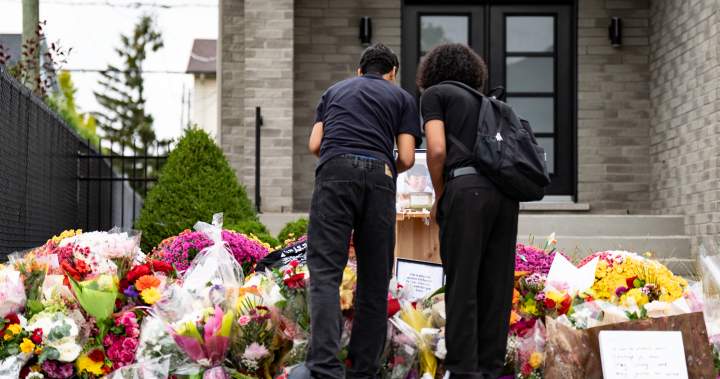The fatal police shooting of a 15-year-old boy in Quebec has renewed calls to make body cameras mandatory for all police officers in the province.
The teenage boy, Nooran Rezayi, was shot and killed Sunday by an officer with the Longueuil police force. Police were responding to reports of a group of armed individuals in a quiet suburban neighbourhood in Longueuil on Montreal’s South Shore at the time of the shooting.
There was only one firearm seized at the scene by investigators from Quebec’s police watchdog, the Bureau des enquêtes indépendantes (BEI), and it belonged to the officer who shot Rezayi, said Brigitte Bishop, head of the BEI, on Tuesday.
The incident has left the community reeling, and a vigil and demonstration planned for Saturday are pushing for the provincial government to outfit all police officers with body-worn cameras.
Projet Montréal mayoral candidate Luc Rabouin expressed sympathy for the community and reiterated his party’s long-standing support for the cameras.
“I have two children, so I understand how shocking it is for the family and people around,” Rabouin told reporters on Wednesday.

Get daily National news
Get the day’s top news, political, economic, and current affairs headlines, delivered to your inbox once a day.
Although the Longueuil police force isn’t under the jurisdiction of the City of Montreal, the Montreal police force previously ran a body camera pilot project between 2016 and 2017, equipping 78 officers with the devices.
The final report found that the cameras did not significantly reduce the use of force and questioned whether the technology justified its high costs — estimated in the tens of millions of dollars.
Despite mounting pressure, outgoing Mayor Valérie Plante’s administration voted down a 2024 motion to adopt the cameras, saying more time was needed. Rabouin, who hopes to succeed Plante in November, said Projet Montréal is ready to move forward but is waiting on the Quebec government to finalize the legal framework.
According to him, the lack of a legal framework from the provincial government is the main reason the initiative has not moved forward.
Some experts however warn against assuming body cameras are a solution and say they don’t necessarily reduce the use of force.
“They’re expensive and they don’t work the what we claim they do,” Étienne Charbonneau, a professor at École nationale d’administration publique, told Global News on Wednesday.
Charbonneau points to privacy concerns, challenges with using footage in court, and lukewarm public support once the price tag is factored in. According to him, support for the technology drops below 50 per cent when taxpayers learn their municipal taxes may be raised to cover the cost.
He also noted that under current privacy laws, it is difficult for the public to access footage, and courts often struggle to analyze the video content due to the time and resources required.
Even some long-time critics of police conduct remain skeptical.
Alexandre Popovic, a spokesperson for the Coalition Against Police Repression and Abuse, said widespread deployment of cameras could amount to “mass surveillance” — one controlled by police themselves. Popovic pointed to how police unions have always been in favour of implementing the devices.
Still, Charbonneau acknowledged that political pressure might eventually push the province to implement body cameras across the board.
The Quebec government has said it has been studying how to structure the use of camera footage in court, but a provincewide rollout has yet to materialize.
The office of Public Security Minister François Bonnardel declined to provide Global News with a comment, as did Soraya Martinez Ferrada, the mayoral candidate for Ensemble Montréal.
On Wednesday, the Ottawa Police Service announced its officers would begin wearing the recording devices as of November.
Toronto police began wearing them in 2020 and approved a service-wide program for all frontline officers. Vancouver launched a pilot project in 2024 that saw 85 officers using body‑worn cameras.
In March 2023, the Alberta government announced plans to make body-worn cameras mandatory for all police officers across the province.
Calgary was one of the first large services to equip all frontline officers with cameras — completed around 2019.
The RCMP began its national deployment of bodycams in November 2024. Frontline RCMP officers in select detachments across Canada began wearing them, and the RCMP said over 10,000 cameras would be deployed, aiming for full deployment in 12‑18 months.
Saturday’s vigil is being organized by the Association de la Sépulture Musulmane au Québec, with permission of the boy’s parents and in coordination with police.
The vigil will be held on Saturday, Sept. 27 at 2 p.m. at Parc de Mille Fleur in Longueuil.
–with files from The Canadian Press
Read the full article here

